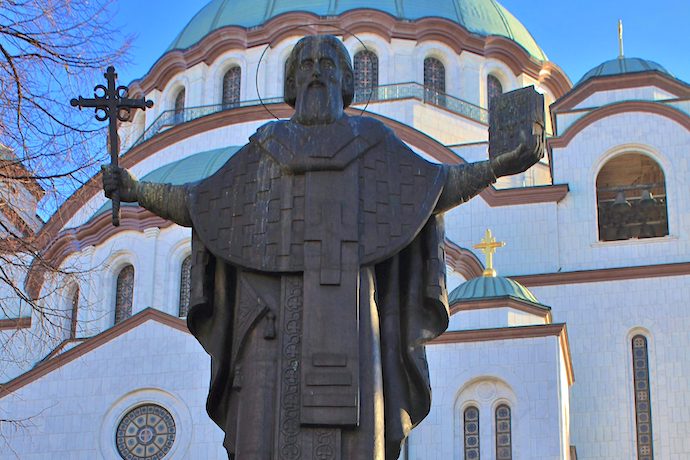On September 5, Patriarch Porfiry of Belgrade, the leader of the Serbian Orthodox Church, awarded the highest degree of the Order of Saint Sava (the Patriarchate’s highest chivalric order) to Hungarian Prime Minister Viktor Orbán. According to a statement, the award was given “for his efforts in defending Christianity in Hungary and throughout Europe, promoting Christian values, as well as because of his personal contribution to the friendship between the Hungarian and Serbian peoples.”
In the past, the idea that the Orthodox Patriarch of Belgrade would, without even a nod toward sectarian differences, honor Orbán for “defending Christianity,” would have struck many as odd. You see, Viktor Orbán is nominally a Protestant—not that you would necessarily know that. Despite Orbán’s frequent appeals to “Christianity,” he doesn’t provide many clues about his particular theology.
In fact, well into writing this article, I simply assumed he was a Catholic, based on the fact that Hungary has a slight Catholic majority and the extent to which he has sought and obtained the support of the Hungarian Catholic Church—even when the Pope has subtly rebuked him. Moreover, I had assumed (inaccurately it turned out) that while a Catholic might receive the Order of Saint Sava, a Calvinist would be a bridge too far for Patriarch Porfiry. Besides, what kind of Calvinist accepts knighthood from a bishop with a literal crown on his head?
It turns out I was wrong, because we live in a very different world than the one in which divisions between Catholics and Protestants, Orthodox and Catholics, Orthodox and Protestants etc, were real and sometimes led to actual wars. We live in a world in which the theological differences that once animated the debates and divisions of the Christian world are seemingly irrelevant in comparison to the so-called culture wars.
The day after Patriarch Porfiry essentially knighted Viktor Orbán he released a statement condemning the celebration of EuroPride in Belgrade. Then on Sunday he led a prayer service for the “sanctity of marriage and family” while thousands of Serbs, in no small part inspired by the Patriarch, took to the streets to protest the planned EuroPride events. These events and the feteing of Orbán are not unrelated.
Notable throughout the week, the Patriarch routinely emphasized the idea that it was outsiders coming to change Serbia’s values who were the threat. This was most clear in his homily following Sunday’s prayer service, in which he said:
“…we do not impose our way of life on anyone, but we also do not want anyone, from any part of the world, to come and impose their values, their view of the world, or their way of life on us. Brothers and sisters, I repeat: we will not [accept this]. Since we do not impose our way of life on anyone, we will not allow anyone to impose on us, his rules, his view of the world and his way of life on us, even if he thinks he is better than us.”
If the Patriarch Porfiry’s words seem to echo the sentiments of Patriarch Kirill, that’s because the two allied clerics are speaking the same language. The instinctive interpretation of their words is to understand the “outsiders” as the West—which shouldn’t be shocking in light of Orthodoxy’s long fight for survival and distinction against Western Christendom—but the recognition of a Hungarian Protestant like Orbán suggests that even that old division is slipping away.
Increasingly it’s clear that the real, and perhaps singular, fault line running through the world is between those committed to a liberal, pluralist future and those who seek an illiberal world in which Enlightenment ideas of personal liberty and autonomy are soundly defeated.
In many historically and cultural Christian countries, this latter ideology has taken the form of Christian Nationalism. Contemporary Christian Nationalists (CCNs) are most certainly Christians; they’re part of a decidedly unique, and arguably quite revolutionary Christian movement whose most revolutionary and historically idiosyncratic features are highlighted by Patriarch Porfiry’s activities and words this past week.
For CCNs there’s an utter lack of concern for doctrinal and theological differences. This is the feature that represents the most dramatic departure from what we’ve historically seen within Christianity and it’s almost certainly the product of the efforts of white American evangelicals to build a post-Civil Rights Era coalition that includes longtime theological enemies such as Latter-day Saints, conservative white Catholics, Orthodox Jews, and Orthodox Christians.
The sublimation of theological difference more than anything else has allowed the rise of the Global Culture Wars. It arguably also signals the extent to which Enlightenment and Marxist paradigms have succeeded even amongst their ideological enemies: We live in a world in which political differences are the significant markers of identity, even for self-described traditionalists. Nothing is more modern than that.
For CCNs the issues that matter most are those concerning gender and sexuality and are articulated through a glorification of the nuclear family. Of course, as a product of the Industrial Revolution, the nuclear family itself, like the individual, is largely a modern invention. But even putting aside this historical inconvenience (history, for CCNs, is nothing if not inconvenient), the idea that the family, and particularly marriage, would become the center of a certain kind of Christian identity is equally odd.
Early and medieval Christianity were decidedly hostile to marriage and even to the family, viewing both as a sometimes necessary, but decidedly poor, substitute for celibacy. Clearly, then, the exaltation of the family among CCNs emerges more from their nationalism than from normative Christian tradition. Nationalism, after all, has its roots in Romanticism, itself a reaction against industrialization. Nationalism inherited Romanticism’s glorification of the domestic sphere as a fortress of virtue against an increasingly corrupt and corrupting world.
It’s in Romanticism that we first see the family celebrated as “natural,” sanctified, and optimal. Nationalism takes up this Romantic celebration of the family and extends it, arguing that one’s nation (and specifically one’s ethnic or racial group) constitutes a kind of extended family imbued with all of the holiness now attributed to the biological family.
Consequently, it shouldn’t surprise us when Viktor Orbán vilifies marriage between Europeans and non-Europeans; or when American CCNs defend the Confederacy; or when Patriarch Porfiry starts fanning the genocidal flames of anti-Kosovar sentiment (his comments regarding a “single Orthodox faith without borders” is essentially code for the idea that Kosovo belongs to Serbia).
None of this excuses the Christian tradition—wildly diverse as it is—for its role in this contemporary phenomenon, but it does rob the CCNs of one of their most important claims: that they represent a historically normative, traditional form of Christianity defending itself against revolutionary modernizers. Like Wahhabis in Islam, CCNs imagine themselves to be the most committed reactionaries, when in fact they are the most revolutionary of them all. There’s power to be gained in reframing the fight as one between two kinds of modernity, not between the time-tested past and an unknown future.
EuroPride is going ahead this week as planned, despite having been officially canceled by the Serbian President who cited pressure from far-right groups and the Serbian Orthodox Church in his decision. Those who join the festivities are undoubtedly arguing for a future that breaks from the past. But so are their CCN opponents—whether they don’t know it or simply refuse to accept it. Either way, it might help the latter’s efforts to remember that.





